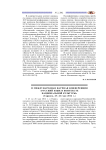Статьи журнала - Интеграция образования
Все статьи: 2526
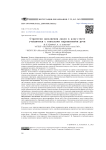
Cтратегии заполнения лакун в клоуз-тесте учащимися с тяжелыми нарушениями речи
Статья научная
Введение. Уровень сформированности текстовой компетенции в аспекте понимания фактуальной информации текста в основной школе обеспечивает успешность освоения предметного содержания обучения. Актуальность исследования стратегий работы с деформированным текстом учащихся ‒ подростков с общим недоразвитием речи обусловлена тем, что ее результаты способствуют определению механизмов недостаточного уровня понимания текстовой информации. Цель статьи – представить результаты исследования динамики реализации ведущих стратегий заполнения лакун в клоуз-тесте у школьников с общим недоразвитием речи, обучающихся в V–X классах. Материалы и методы. В качестве основного метода исследования на уровне констатирующего эксперимента использовался модифицированный метод клоуз-теста. Результаты выполнения клоуз-теста, в качестве которых служили ученические работы по заполнению лакун в тексте, подвергались количественно-качественному анализу. На аналитическом этапе исследования применялись методы выделения признаков и факторов, корреляционный анализ. Математическая обработка осуществлялась с использованием однофакторного дисперсионного анализа ANOVA. Результаты исследования. На основе качественно-количественного анализа работ учащихся выявлены три основные группы стратегий линейного развертывания и вероятностного прогнозирования: установление семантических связей на уровне лексического компонента, на уровне ассоциаций, отсутствие стратегии. Анализ субститутов в отношении их соответствия грамматическим требованиям позволил выявить следующую типологию проявлений аграмматизма: неверное использование частей речи, ошибки оформления грамматической связи в рамках словосочетания, несоответствие грамматической формы субститута требованиям к грамматическому оформлению предложения. С помощью корреляционного анализа обнаружены связи между различными видами стратегий заполнения лакун подростками с общим недоразвитием речи, а также их взаимосвязь с уровнями понимания фактуального содержания текста. Обсуждение и заключение. Выявленные характеристики функционирования механизмов линейного развертывания и вероятностного прогнозирования текста могут быть использованы в целях диагностической, коррекционной и образовательной работы со школьниками. Полученные результаты вносят вклад в развитие онтолингвистики, дизонтолингвистики, специальной педагогики, логопедии и школьной методики развития речи.
Бесплатно
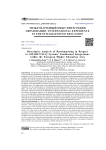
Статья научная
Introduction. The strategy for the development of international education ERASMUS 20.30 stimulates the study of how intellectual integration programmes are introduced into the system of further education of universities around the world. The research is relevant, for studying the integration of intellectual potential in a single space of higher and further education EHEA allows to determine the efficacy of application of world benchmarking technologies in the management of SMART/UNI-Q systems and the convergence of world universities. The EU Education Department conditioned the significance of the research content by the target request to investigate the change in the benchmarking mission at the international education market and to make a thorough informational review of its application in the international activities of universities in the EU, CIS and the Russian Federation for the dissemination of information by international partner universities of ERASMUS central office. The study aims at identifying general and specific indicators of sustainable international partnerships that affect consumer demand at the international education and labour markets by means of concretization of an extensive descriptive analysis of the intellectual integration benchmarking and the description of the processes of benchmarking technology application, its scientific identification and implementation in individual universities, university alliances and consortia. Researchers were looking for an answer to the question: why, with high interest and theoretical recognition of technology benchmarking in quality management, universities show low rates of benchmarking in assessing the quality of their international activities. Materials and Methods. It is the first time that the research of benchmarking intellectual integrations in the university international activities uses the method of descriptive analysis. The study identifies active sectors of the SMART / UNI-Q benchmarking for the entire set of data voluntarily submitted by the universities participating in the projects of the Austrian Institute for Intellectual Integrations in the pre-pandemic period of 2017-2020. The participating countries have analyzed the share of key participants and the share of published benchmarking studies. The study analyzes the changes in the benchmarking mission in the international education market in accordance with the needs of global consumers. The analysis uses the data of the bases of the EU Department of Education, the ETINED platform and open-access European dissertation reviews portals. The research uses the WERGELAND European Resource Center data as the comparison point indicators. The study presents an analysis of five segments of international benchmarking: transparency, diversity, “product line”, digital activity, and digital management tools. Modus infographics shows the real, improved and ideal models. The applied comparative analysis studies the asynchrony of academic mobility during the COVID crisis. Results. The research findings show low value of efficiency indicators for the use of intellectual integration benchmarking in the international cooperation of university alliances. The predominance and stable efficiency in the use of benchmarking takes place at certain universities in Europe during periods of activity in implementing new strategies of international education and only for a short time most often during the periods of university accreditation. The model for overcoming sustainable development asynchronies in the management of SMART/UNI-Q systems according to the criterion of guaranteeing the quality of higher education in international cooperation EHEA is not final and today it is possible to characterize it through descriptive indicators. Amid the economic crisis and turbulence associated with the COVID-19 pandemic, a decline in large-scale academic mobility is an inevitable trend. However, due to the growing difference in the responses of economies and management in the field of higher vocational education between developed and less developed countries, as well as with the strengthening of general trends in economic integration, the number of academic migrants is likely to increase. Asynchrony, that is, unevenness, of opportunities and adaptation to the new digital environment of university consortia and the possibility to implement the opportunities in practice has become a psychological problem of scientific migration. Discussion and Conclusion. The materials of this article will be useful to CEO-s of international universities, heads of departments of international activities, employees of ERASMUS national offices, coordinators of ERAS-MUS+ projects, departments of continuing professional education and academic mobility in the development of promising strategies for external and internal benchmarking of inter-university projects of intellectual integration and international activity quality management.
Бесплатно
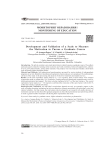
Development and validation of a scale to measure the motivation to pursue a graduate course
Статья научная
Introduction. The article considers some motivation factors related to pursue a graduate course. The authors analysed aspects related to learning, better economic and work conditions, better job opportunities, alternatives to grow professionally, among other elements. Our purpose was to develop and validate a motivation scale to pursue higher education studies. Material and Methods. Self-administered questionnaires answered by senior students of undergraduate programs in our city Medellin (Colombia) and exploratory factor analyses were employed. The methodological basis of the study is the processing and analysis of interview materials and student surveys. Results. In the first exploratory factor analysis (n = 315 registers), three of four factors were retained (eigenvalue equal or greater than 1.0): Economics, Employment and educational competitiveness, and Institutional promotion and support. The factor solution explained 62.62 % of the total variance. The second exploratory factor analysis (n = 316 registers) confirmed the extraction of the same factors with 64.041 % of the total variance explained by them. Discussion and Conclusion. An individual's motivations depend not only on economic aspects or the work of higher education institutions but also on subjective elements associated with individual, social and cultural variables. For that reason, the motivation scale developed in our research will enable directors of institutions and universities that offer graduate programs to direct their promotional and advertising efforts to reach a greater number of people considering their expectations and needs.
Бесплатно
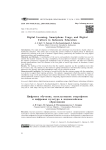
Digital learning, smartphone usage, and digital culture in Indonesia education
Статья научная
Introduction. The rapid development of information and technology has procreated a digital culture in Indonesian education. This article aims to depict the current condition of digital culture in Indonesian education by pointing at the issue of students' digital fluency, particularly the readiness for using digital learning resources and smartphone usage. Materials and Methods. A combination of the survey and qualitative descriptive method was used to identify the students' intensity of using a smartphone, the description of students' smartphone usage, and the students' perspectives regarding the smartphone usage in learning activities. The data were collected through questionnaires from 384 students in the first grade of senior high schools in Surakarta, Central Java, Indonesia. Results. The findings of the research show that the students regularly use the smartphone more than 6 to 7 hours a day. The students use the Internet to gather information or download the learning materials. Moreover, they strongly agree that smartphone usage will give benefits to them. Discussion and Conclusion. The findings of research reflect that the students engage with the smartphone as a device to support their learning activities. The students' engagement reflects the positive impact of smartphone usage on the psychological and cultural dimensions of the students. Moreover, the teachers should uphold the students' digital culture by integrating digital material resources and smartphone usage into classroom activities.
Бесплатно
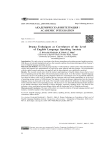
Drama techniques as correlators of the level of English language speaking anxiety
Статья научная
Introduction. The study aims to investigate what factors strengthen and weaken personal speaking anxiety. With the use of selected standardized surveys, the research examines how drama techniques affect a learner's level of English language speaking anxiety. Materials and Methods. The research group includes 17 Polish primary school learners who attended drama classes and prepared two performances in English for other learners and their parents. The questionnaire with the stated research questions was applied, and the data obtained were statistically analyzed. Results. The research results show that the learners participating in English drama classes had a lower level of speaking anxiety than those who did not practice drama at all. As to the learners' English language proficiency, the level of speaking anxiety dropped with the rise of academic level. No significant difference was observed either in the level of speaking anxiety between male and female participants or in the level of speaking among learners of different age. The impact of drama techniques implemented into the English language classes is discussed in the study. The research results indicate the influence of drama techniques on the reduction of the level of speaking anxiety. The decrease is very noticeable that should inspire teachers to use drama techniques while teaching a foreign language, especially speaking skills. The analysis also indicates a close correlation between drama classes and the increasing level of English proficiency. Discussion and Conclusion. The topic of the article is to meet the interest of foreign language teachers and learners, would-be teachers of the English language.
Бесплатно
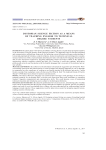
Dystopian science fiction as a means of teaching English to technical degree students
Статья научная
Introduction: the article deals with various possibilities of using literary excerpts from dystopian narrative in the classroom of English learners from technical institutes. This approach could fit into the traditional and communicative methodology framework for furthering a more informed and deeper understanding of lexical and grammatical formulas, syntactic relations, discursive particulars and extralinguistic concepts. Science fiction texts with a clear dystopian undertone provide a rich material for language-based analysis and in-class discussions inspired by poignant multimodal creative discourse related to the spheres of engineering, robotics, academic research and daily life. Therefore, it could raise students' motivation, professional curiosity and fascination with the English language that is now part of the technical university syllabus. Materials and Methods: the author uses the theoretical and practical suggestions put forward by Western teaching ideologists and practicionaries of such literature and language approach as well as attempts to summarize her own experience of working as an English teacher at the technical university. Certain literary excerpts from exemplary science fiction novel by Philip K. Dick "Do Androids Dream of Electric Sheep?" (1968) have been chosen for analysis and discussion. Results: The article showcases language uses and discourse messages in the passages of our choice as potential material for developing tasks, activities and discussions that could contribute to expanding students' linguistic competencies and communicative skills. This could become a way of humanizing technical education and introducing socio-cultural or technological dilemmas. Discussion and Conclusions: the ideas for grammatical or lexical exercises, entertaining tasks or debate topics can be incorporated into the English courses that make an emphasis on general, specific or academic aspects and seek to avoid overloading their syllabus with non-contextualized or condescending English language textual material. These suggestions could be taken into account for preparing regular lessons, reading sessions or home tasks.
Бесплатно
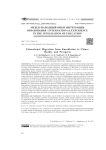
Educational migration from Kazakhstan to China: reality and prospects
Статья научная
Introduction. The relevance of the study is determined by the gradual expansion of educational cooperation between Kazakhstan and China and the need to identify the competitive advantages of the educational system of China over Kazakhstan's system of higher education. The purpose of the article is to identify factors stimulating dynamic growth of educational migration from Kazakhstan to China, as a relatively recent phenomenon, and to evaluate its possible consequences. Materials and Methods. In order to identify main trends and the way of development of Kazakhstan-China educational relations, we used empirical methods; namely: qualitative research method, description, expert interviews, content analysis, and synthesis. A survey of Kazakhstani students studying in China was conducted. The students of the Department of Chinese Studies of Al-Farabi Kazakh National University were interviewed, as well as those who participated in the joint training program with the Lanzhou University. Kazakhstani students from Beijing University of Language and Culture also participated in the survey. Results. The main reasons for the dynamic growth of educational migration from Kazakhstan to China are high quality of education in China, access to education in Chinese universities, comfortable learning and living conditions for Kazakhs, etc. By analysing the statistical data of the Chinese Ministry of Education, timing of the dynamics of Kazakhstani students' flows to China was presented. The legislative and governmental measures of the two countries aiming to create a basis for educational cooperation were also analysed. An attempt to predict the future activities of Kazakhstan students as the "soft power" of China in Kazakhstan was made. Discussion and Conclusion. This problem can be further investigated in the study of factors affecting the increase in the academic mobility of Kazakhstani students, which should contribute to the expansion of cooperation between Kazakhstan and China in the field of education. The results of this study may be useful to scientists and lecturers engaged in research on various aspects of the educational migration of Kazakhstan to China.
Бесплатно
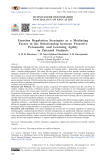
Статья научная
Introduction. Although previous research has separately addressed proactive personality and emotion regulation, the combined effect of these variables on learning agility – particularly among talented students – remains underexplored. This study fills this gap by focusing on how specific emotion regulation strategies mediate this relationship. In today’s rapidly evolving educational landscape, learning agility has emerged as a crucial meta-competency for adapting to new challenges. This study investigates how emotion regulation strategies mediate the relationship between proactive personality and learning agility among talented students. With the increasing recognition of the role of personality traits and emotion regulation in effective learning, understanding these dynamics is essential for supporting students in navigating academic and social demands. Materials and Methods. The research sample comprised 297 talented students from the University of Isfahan, Isfahan University of Medical Sciences, and Isfahan University of Art. Participants completed three assessments: the Gravett and Caldwell Learning Agility Questionnaire, Gross and John’s Emotion Regulation Questionnaire, and the condensed Bateman and Crant Proactive Personality Questionnaire. Data analysis included statistical methods to determine both direct and mediating effects of proactive personality and emotion regulation strategies on learning agility. Results. The analysis revealed that proactive personality significantly affects learning agility, and emotion regulation strategies – specifically reappraisal and suppression – mediate this relationship. Students who effectively manage their emotions are better equipped to exhibit higher levels of learning agility, indicating a stronger ability to adapt and thrive in academic environments. Discussion and Conclusion. This study highlights the pivotal role of emotion regulation in enhancing learning agility, emphasizing that effective emotion management can significantly influence academic success. The findings suggest that interventions focusing on emotion regulation could improve learning outcomes for talented students. Future research should further explore additional factors influencing learning agility and develop targeted strategies to support student adaptation in diverse educational settings.
Бесплатно
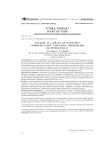
English as a means of scientific communication: linguistic imperialism or interlingua?
Статья научная
Introduction: the process of globalisation has strengthened the position of the English language as a means of communication in all spheres of life, including scientific communication. The expansion of one language not only necessitates changes in the status of other national languages and the emergence of a hierarchical relationship between them, but also significantly affects the political and economic balance of power in the world. The global dominance of English in science not only confers distinct advantages on its native speakers but also discriminates against scholars from non-Anglophone societies. As a result, a threat arises concerning the loss to humanity of unique, culture-specific ways of understanding reality. Materials and Methods: on the basis of an analysis of modern trends and literature review, such manifestations of linguistic imperialism in the field of academic communication as the IMRaD format, CLIL teaching technologies and English academic writing centres are revealed. Subsequently, these phenomena are investigated using empirical sociological methods: in-depth expert interviews, participant observation and the content study of chemistry papers indexed in Scopus. Results: it is demonstrated that the Anglophone societies use the global distribution of the English language to advance their competitive advantage in the field of science. The implementation of English language instruction in higher education and Anglophone communicative patterns in scholarly communication -particularly with regard to the representation of research results - might have a negative effect both on the development of researchers' competencies and their future effectiveness in advancing science. Discussion and Conclusions: it is concluded that an increased awareness of potential threats caused by the dominance of the English language in scientific communication is needed among all the participants of scientific communication, including higher school lecturers. This can be achieved by using bilingual and bicultural educational approaches.
Бесплатно
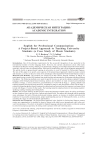
Статья научная
Introduction. One of the ultimate requirements for the successful integration of any specialist to the international market is his/her language skills. However, the current educational system often lacks streamlined techniques meeting challenges of dynamically changing sociocultural and professional settings, especially, when it comes to communication, field-specific terminology and self-development opportunities. The article dwells on project-based learning at universities in view of English for Professional Purpose. The aim of this paper is to specify some aspects of the project-based approach related to project content and structure, as well as to discover some of its advantages in the English for Professional Purpose-context. Materials and Methods. The research was carried out at the Gnesins Russian Academy of Music, its participants having exceeded 500 students from eight faculties and amounted to 40 educators teaching different disciplines. The following methods were used to specify the ways to university enhance students' English language skills through project-based learning: analysis and synthesis to study research and methodical literature at Stage 1; survey (interviews, questionnaires) to work with at Stage 2 - getting students and teachers prepared for project-based activities; comparative analysis and description to deal with at Stage 3, related to integrating project-based learning into educational and sociocultural environment, and supervision to deal with Stages 2, 3 and to fix the results. The learning material comprised items for developing students' speaking, reading, listening and writing skills. Results. The research findings include project content-and-structure-related aspects involving such factors as time, duration, form, type, activities, context and related fields. The authors also brought into the spotlight some advantages for more efficient professional training, namely, an increase in student motivation and readiness for successful communication, proper understanding and use of field-specific terms, as well as extending the range of self-development opportunities. Discussion and Conclusion. The project-based approach in the English for Professional Purpose context creates new opportunities for students to learn to interact with others on an international scale in the real-world circumstances. The article is intended for English language educators and learners worldwide seeking to enrich mixed group experience by doing creative projects with real-world outcomes.
Бесплатно
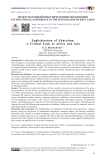
Englishization of education: A critical look at Africa and Asia
Статья научная
Introduction. Globalization has dramatically transformed existing educational paradigms, with English emerging as a dominant language in academia and the workforce. This phenomenon, known as “Englishization”, particularly affects educational systems in Africa and Asia through their adoption of English Medium Instruction (EMI). The article aims to explore the motivations, challenges, and impacts of EMI in these regions, focusing on linguistic identity, educational equity, and pedagogical effectiveness.
Бесплатно
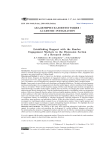
Статья научная
Introduction. The paper studies the use of engagement markers in discussion sections of English-medium research articles in medical and foreign language teaching domains by two groups of academic writers, Anglophone and non-native ones using English as a Lingua Franca. Materials and Methods. In order to explore how disciplinary considerations and author language backgrounds affect the choice, frequency and distribution of engagement markers, we built a corpus of 68 research papers (34 medical and 34 EFL papers) published in international and national academic journals between 2019 and 2022. The markers were investigated using contrastive analysis applying Hyland & Jiang’s modified model. Results. Corpus analysis stressed both cross-disciplinary and language distinctions. The analysed foreign language teaching research papers rely on engagement more than the medical papers, which is manifested in the frequency of the use of markers. Writers in both disciplines engage with the reader through reader mentions and appeals to shared knowledge, but unlike medical papers, teaching ones rely heavily on managing the readers’ attention and addressing them directly through asides. From the linguacultural perspective, Anglophone writers use engagement markers a little more frequently than the authors from non-English-speaking countries. The main distinction lies in direct addresses to the reader which are realised in personal asides and questions. Overall, Anglophone writers tend to use a broader variety of engagement markers than non-Anglophone authors. The frequency and selection of engagement markers are influenced by language background, reflecting differences in linguistic-cultural conventions, target audiences, and publication contexts. Within the global scientific community, it is crucial to investigate how multilingual authors navigate the use of metadiscourse markers. Native English speakers and non-native speakers engage in a dialogue as equals, disregarding linguistic dominance. This highlights the need for unified conventions in establishing a global academic lingua franca. Discussion and Conclusion. The findings of this study hold significant pedagogical implications, providing support for academic writers and promoting the development of a global academic language and culture. By understanding the dynamics of engagement markers and their role in effective communication, pedagogical efforts can focus on enhancing global academic language skills and fostering a cohesive global academic culture.
Бесплатно
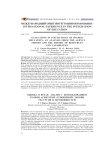
Статья научная
Introduction: the objective of this paper is to explain through the agency theory and theory of resources and capacities as is the process of assessment in higher education institutions. Materials and Methods: the methods used are the analytical and descriptive of the literature review on the issue of evaluation occurring in Institutions of Higher Education in Mexico. Results: the actors that are involved in the decision-making and the use that is giving the resources derived from repeatedly to practices that opportunistic diminishing the value that is given to the evaluation, in addition to the decrease in team work. After describing the background and delimitation of the problem, it is justified the aim of this paper which is to present an overview of how the evaluation process, the actors involved and conflicts that may arise as a result of that process. Discussion and Conclusions: as a theoretical background of this paper, it is supported by the agency theory and the resource and capabilities theory both from the field of strategy. The main conclusion argues that the evaluation of Higher Education Institutions in Mexico should be a tool to encourage continuous improvement. Self-evaluation becomes a key part of these processes, but this will be useful to the extent that stakeholders are aware of their actions, that there is a change of mentality less focused on control, money and the market, greater teamwork and knowledge generation applicable to the local context.
Бесплатно
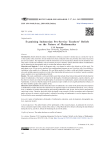
Examining Indonesian pre-service teachers' beliefs on the nature of mathematics
Статья научная
Introduction. Beliefs about the nature of mathematics influence a teacherʼs mindset and, as a result, the way he or she teaches in the classroom. Several studies have been conducted in this area, but they have rarely focused on pre-service teachers. The implication is that the instruments used to measure these beliefs must be modified. This study aims to refine and validate a scale to measure pre-service teachersʼ beliefs about the nature of mathematics and to determine the demographic analysis results that influence these beliefs. Materials and Methods. A scale development study was adopted to achieve the objectives of this study. The participants were 410 pre-service teachers from undergraduate programs at one University with A (excellent) accreditation in the capital city of Indonesia. We used factor analysis to obtain a valid and reliable instrument. We also used multiple regression analysis to look at the relationships between pre-service teachersʼ gender, academic major, academic level, and mathematical beliefs. Results. This study established a valid and reliable scale that includes three factors that underlie beliefs about the nature of mathematics. One factor is related to the philosophy of traditional mathematics, namely objective, and the other two factors are related to the philosophy of constructivism mathematics, namely relevant and dynamic. Additionally, we discover that the impact of the academic major variable is more significant than the influence of the other variables (gender and academic level). Discussion and Conclusion. Beliefs about the nature of mathematics are central to the professional development of mathematics teachers because these beliefs have an implicit impact or are related to the beliefs, views, conceptions, or attitudes of teachers about teaching and learning mathematics and, in turn, lead to choices and practices carried out in class. Therefore, the beliefs scale developed in our research will allow researchers and/or interested parties to know the extent to which teachersʼ subjective knowledge of mathematics is used to improve these beliefs and lead to more meaningful mathematics practices.
Бесплатно
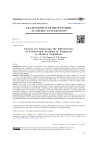
Factors for improving the effectiveness of professional training of employees in modern conditions
Статья научная
Introduction. Human resources are likened to the backbone of any organization ensuring its sustainable development and competition. Investment in the workforce through training programs brings back the best fruitful achievements. This study investigated six basic factors affecting the training effectiveness in Vietnam, which is considered as burdensome matters to any organization in terms of having a skilled workforce to meet the current working situation. Materials and Methods. The study employed a mixed-methods approach involving a sample of 370 with e = ±5% over the population of 10,000 civil servants in Hanoi City. The quantitative data from the 5-Likert scale questionnaire among 370 respondents were addressed by IBM SPSS v.25. The semi-structured interviews relative to the same factors in the questionnaire were conducted with another 79 respondents to verify the validity of the research using NVivo v.12 for data treatment. Results. The results of the study revealed the dissatisfaction of employees with the training programs of professional development. The authors recommend to create a competent system of motivation to improve the effectiveness of training and development of employees. The leaders should conduct needs analysis seriously to comprehend the real expections of employees so that they could satisfy what lack of expertise skills and knowledge employees want to be updated. Besides, the incentive schemes and job promotion feasibilities are availed to any employee who is successfully performed well at work after the training courses. Discussion and Conclusion. The conclusions made by the authors contribute to the development of innovative training technologies in the system of professional development of the company staff. The results of the study will help HR professionals in the development of effective training programs that meet the expectations of employees.
Бесплатно
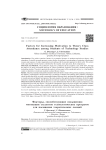
Factors for increasing motivation to theory class attendance among students of technology studies
Статья научная
Introduction. The article examines factors for a potential increase in student motivation to theory class attendance. Scientific research presents various factors for students' non-attendance, beginning with personal reasons and nuances of study organization and ending with the teacher approach to their work. This article looks specifically into the factors controlled by the teacher, more precisely, their competences. Materials and Methods. The qualitative study was conducted in the academic year 2018-2019, through the analysis of study motivation opinions of Vilnius Gediminas Technical University students majoring in technology studies. The article presents the analysis of one aspect of the conducted survey, i.e., what teachers could or should do to motivate students to attend theory classes. Results. The processed data indicated that students link motivation to study to three primary teaching competences: the didactic, communicative and personal ones. According to students, the teaching staff's didactic competence should include the ability to create a reasonable balance between theory and practical application, the capability to visually present and impart focal points of the study material, the capacity to plan out lectures, the skill to apply interactive studying methods, and the potential to motivate students by introducing accumulative bonus grades. Discussion and Conclusion. While there was a clear differentiation between three teacher competences, the weight placed on each one differs. The didactic competence carries the most weight, and teachers should, therefore, reflect on whether they establish an optimal state of balance between theory and praxis; prepare visually appealing lectures, and consistently and structurally convey the study material, etc.
Бесплатно
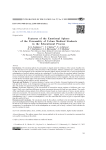
Статья научная
Introduction. The emotional sphere of a personality is shaped under the influence of the system of public relations, which has its own specifics in the universities of the metropolis. Modern conditions have a limited amount of data on the development of the emotional and personal sphere and the possible risks of socio-psychological maladaptation of medical students studying in a megalopolis. For the first time, the emotional sphere of personality is considered in the context of manifestation of possible social maladaptation (conflict, stress, anxiety, neuroticism) of medical students in the conditions of the educational process in the megapolis. The aim of our work was to look into the emotional sphere of the personality of urban medical students in the conditions of the educational process drawing on their conflict, anxiety, neuroticism. Materials and Methods. 105 medical students of various years of studies, living and studying in the megapolis, took part in the survey. A set of diagnostic techniques was used. The cross-sectional method was used to collect data. The results were processed using the SPSS program. Results. Significant differences in the assessments of neuroticism among students of different years were found. There was a significant difference in stress assessments between first and last year students. The results differ significantly among students from different clusters based on cluster analysis of stress, anxiety and neuroticism assessments. The assessment of anxiety, stress and neuroticism makes it possible to talk about certain types of students in the context of maladaptation: type 1 - adapted, type 2 - have risks of development of maladaptation, type 3 - prone to maladaptation. It was also noted that the conflict of girls is expressed higher than the conflict of boys. Discussion and Conclusion. The conclusions made by the authors contribute to the development of psychological and pedagogical knowledge that improves the training systems in a medical university. The materials of the article can be useful for teachers and administrators when interacting with students of all years of study. The assumption of a combination of all social maladaptation on a certain year of study is refuted, which indicates the need to continue the study.
Бесплатно
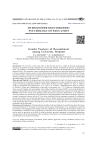
Gender features of ressentiment among university students
Статья научная
Introduction. The relevance of the topic relies on the fact that until now, within the Russian psychological discourse, the problem of gender characteristics of university students’ resentment did not have an autonomous status. The problem of ressentiment in the student environment is poorly developed both at the theoretical and empirical levels. The researchers usually confine themselves to analyzing its individual components (aggression, revenge, resentment, jealousy and envy) and without précising the gender specification of their severity. The purpose of the article is a theoretical and empirical study of the ressentiment constructs characteristic for university students: resentment, revenge, envy, jealousy and aggression, as well as fixing the degree of their manifestation and relationship in the gender projection. Materials and Methods. The empirical part of the article demonstrates the results of a study on measuring the declared constructs of ressentiment among university students (aggression, revenge, resentment, jealousy and envy) using the following standardized methods: “Buss-Durkee Hostility Inventory (BDHI)” (A. Bass, A. Durkee), “Scales of resentment and vindictiveness” (E. P. Ilyin, P. A. Kovalev), “Multidimensional scale of jealousy” (S. Pfeiffer, P. Wong) and “Methodology for the study of personality envy” (T. V. Beskova). Diagnostic procedures covered 93 people. The questionnaire “Buss-Durkee Hostility Inventory (BDHI)” involves the definition of aggression through the following scales: physical aggression, indirect aggression, irritation and verbal aggression. Results. Based on the results of an empirical study, the presence of gender characteristics of ressentiment in university students was revealed by fixing differences in the manifestation of the declared constructs: aggression, revenge, resentment, jealousy and envy. It has been established that the dominant constructs of ressentiment among male students are revenge and aggression; while for female students are resentment, jealousy and envy. Ressentiment among students is ambiguous. On the one hand, it has a detrimental effect on the spiritual dimension of the personality and its creative development; on the other hand, it plays the role of a psychological defense mechanism for the individual. Discussion and Conclusion. The data obtained contribute to the development of scientific ideas about the ressentiment determination in the student environment and the gender characteristics of its manifestation, enrich the psychological and pedagogical knowledge with the methodology for identifying the functional constructs of ressentiment as a destructive form of protecting an individual in an alienated reality. The materials of the article can be useful to specialists in the field of social psychology, preventive pedagogy, deviantology, genderology, enriching them with an understanding of the mechanisms of formation of resentment and gender specificity of its manifestation in the student environment.
Бесплатно
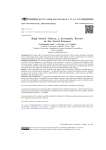
High School Failure, a Systematic Review in the Social Sciences
Статья научная
Introduction. This study aims to examine the issue of high school failure in social sciences through a systematic review. It aims to provide a critical assessment of research on this subject. It seeks to question the very construct of high school failure, its premises, and the possible consequences from this perspective. Materials and Methods. The research published between 2010–2020, both in Spanish and English in the Scopus and Web of Science databases (Core collection), was considered. A total of 171 articles were identified. After initial screening, 37 papers were finally selected. Semantic maps were created with the Vosviewer. The literature was examined to determine where high school failure is being researched, what type of methodologies are most used and, finally, what impact the research has had on our understanding of this concept. Results. It was found that most of the research on the topic is done in the field of education, and that the methodology used is predominantly quantitative. The different definitions of high school failure tended to attribute its cause to one or more of four reasons: student failure, multicausal phenomena, social exclusion, and finally, disability in the education system. Discussion and Conclusion. It is possible to understand that high school failure is understood and defined as mostly involving studentsʼ responsibility for the academic outcome and achievement obtained. Although studies that cover such factors as a multicausal nature, social exclusion, and the education systemʼs difficulty can be found, the responsibility for failure tends to be attributed to the individual student.
Бесплатно

